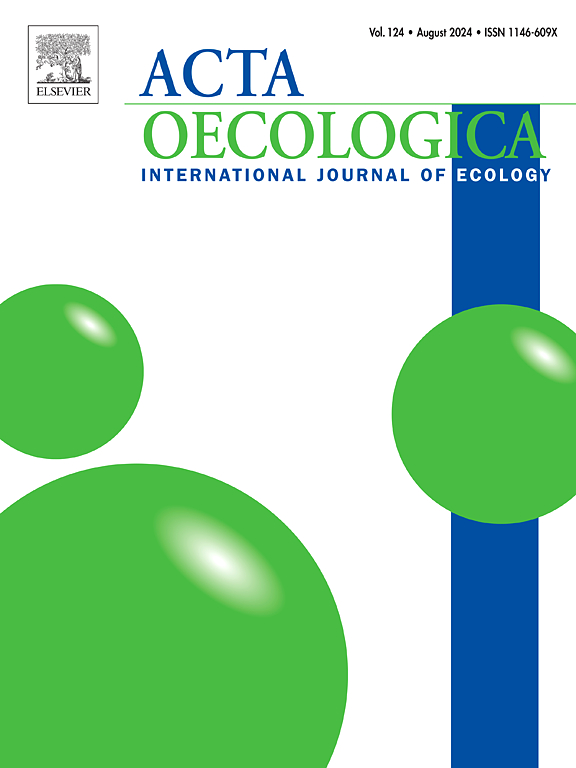Rainfall influences plant richness and predicts birds phylogenetic signal in bird-fruit interactions across the globe
IF 1.3
4区 环境科学与生态学
Q3 ECOLOGY
Acta Oecologica-International Journal of Ecology
Pub Date : 2025-03-21
DOI:10.1016/j.actao.2025.104074
引用次数: 0
Abstract
Interactions between frugivorous birds and plants derive from current ecological contingencies and species’ evolutionary history, yet disentangling the relative role of these drivers in assembling biotic communities is challenging. As species usually inherit functional traits from a common ancestor, the interactions between fruit-eating birds and plants may show strong phylogenetic signals (i.e. closely related bird species share similar plant partners). However, we are still largely unaware of how climatic factors may influence the phylogenetic signals in bird-fruit interactions. Here, we investigated whether higher precipitation and temperature (i.e. higher primary productivity), together with climatic stability (i.e. lower precipitation and temperature seasonality), increase plant richness and promote stronger phylogenetic signals of both birds and plants. We found annual rainfall and temperature stability predicted plant richness. Birds phylogenetic signal was associated with mean annual precipitation, but the phylogenetic signal of plant species was not associated with any climatic predictor. We suggest that higher rainfall facilitates the coexistence among frugivorous birds by providing more fruits, which allows closely related birds to use similar resources. Understanding how ecological and evolutionary contingencies act to shape bird-fruit interactions at large spatial scales may help us predict macroecologial patterns that generate and maintain biodiversity.
降雨影响植物丰富度并预测全球鸟-果相互作用中的鸟类系统发育信号
果食性鸟类和植物之间的相互作用源于当前的生态偶然性和物种的进化史,然而,解开这些驱动因素在生物群落组装中的相对作用是具有挑战性的。由于物种通常从一个共同的祖先那里继承功能特征,食果鸟类和植物之间的相互作用可能显示出强烈的系统发育信号(即近亲鸟类拥有相似的植物伴侣)。然而,我们仍然很大程度上不知道气候因素如何影响鸟-果相互作用的系统发育信号。本文研究了较高的降水和温度(即较高的初级生产力)以及气候稳定性(即较低的降水和温度季节性)是否增加了植物丰富度,并促进了鸟类和植物更强的系统发育信号。我们发现年降雨量和温度稳定性预测了植物的丰富度。鸟类系统发育信号与年平均降水量相关,而植物物种系统发育信号与气候预测因子不相关。我们认为,高降雨量提供了更多的果实,从而促进了食果鸟类之间的共存,从而使近亲鸟类能够使用相似的资源。了解生态和进化偶然性如何在大空间尺度上塑造鸟-果相互作用,可以帮助我们预测产生和维持生物多样性的宏观生态模式。
本文章由计算机程序翻译,如有差异,请以英文原文为准。
求助全文
约1分钟内获得全文
求助全文
来源期刊
CiteScore
3.60
自引率
0.00%
发文量
57
审稿时长
>0 weeks
期刊介绍:
Acta Oecologica is venue for the publication of original research articles in ecology. We encourage studies in all areas of ecology, including ecosystem ecology, community ecology, population ecology, conservation ecology and evolutionary ecology. There is no bias with respect to taxon, biome or geographic area. Both theoretical and empirical papers are welcome, but combinations are particularly sought. Priority is given to papers based on explicitly stated hypotheses. Acta Oecologica also accepts review papers.

 求助内容:
求助内容: 应助结果提醒方式:
应助结果提醒方式:


